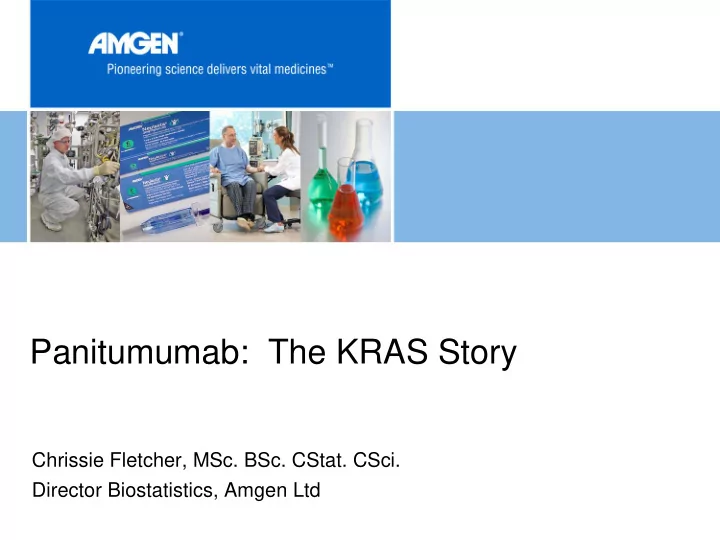

Panitumumab: The KRAS Story Chrissie Fletcher, MSc. BSc. CStat. CSci. Director Biostatistics, Amgen Ltd
Clinical Background: panitumumab in mCRC Panitumumab is a fully human IgG2 monoclonal antibody directed against EGFR Colorectal Cancer – ~ 20% present with metastatic disease, ~ 50% will develop it Panitumumab development program covers 3 lines of mCRC therapy each with a phase 3 study – 1 st Line in combination with chemotherapy: FOLFOX ± panitumumab – 2 nd Line in combination with chemotherapy : FOLFIRI ± panitumumab – 3 rd Line monotherapy: BSC ± panitumumab KRAS story started in the monotherapy setting with the phase 3 study – Positive study (HR=0.54, p<0.0001) but CHMP concluded benefits did not outweigh the risks
Phase 3 Study Provided an Experimental Setting to Assess KRAS in 3 rd line mCRC KRAS Hypothesis was generated independently of the phase 3 data – Biologic plausibility of the KRAS hypothesis (20 years of research) – Available external and internal data (from Amgen’s phase 2 monotherapy studies) suggested restricted benefit only for patients with wild-type tumors KRAS was the only biomarker evaluated for correlation with clinical outcome Expected KRAS evaluable sample size was sufficiently large to ensure random allocation between treatment arms A reliable KRAS testing kit was available – A comparison study identified an assay that could be used in routinely available clinical specimens (DxS Mutation Test Kit) Testing performed in an independent laboratory without patient-level knowledge of randomization or outcome
Prospective KRAS Statistical Analysis Plan for Phase 3 Study The KRAS Statistical Analysis Plan (SAP) was finalized prior to unblinding of KRAS status Objectives were to formally address the KRAS hypothesis: – To test that the treatment by KRAS interaction on PFS – To test the treatment effect on PFS, objective response and overall survival in KRAS wild-type stratum – Analysis designed to control overall type 1 error for the set of comparisons in the KRAS analysis This Prospective/Retrospective analysis (July 2007) provided robust evidence for treatment by KRAS interaction – High ascertainment of KRAS on archived samples (92%) – Large separation of treatment effect on PFS by KRAS Status with quantitative interaction test P-value < 0.0001 EMA conditional approval in Dec 2007 – Specific obligation: a phase 3 study head-to-head with cetuximab
Increased PFS Observed in Patients with KRAS Wild-type Tumors Wild-type Mutant Median Median 100% 100% Events / n (%) (weeks) Events / n (%) (weeks) Pmab + BSC 115 / 124 (93) 12.3 Pmab + BSC 76 / 84 (90) 7.4 90% 90% BSC Alone 114 / 119 (96) 7.3 BSC Alone 95 / 100 (95) 7.3 80% 80% Percent Event-free Percent Event-free 70% 70% 60% 60% 50% 50% 40% 40% 30% 30% 20% 20% 10% 10% 0% 0% 0 4 8 12 16 20 24 28 32 36 40 44 48 52 0 4 8 12 16 20 24 28 32 36 40 44 48 52 Weeks Weeks Hazard Ratio = 0.45 (95% CI: 0.34–0.59) Hazard Ratio = 0.99 (95% CI: 0.73–1.36) Stratified Log Rank Test p < 0.0001 Quantitative interaction test p < 0.0001 Adapted from: Amado, et al. J Clin Onc. 2008;26:1626-1634. 5
Discovery of KRAS as a Predictive Biomarker Changed the Clinical Landscape of mCRC Enrolment (unselected population) for the two phase 3 trials of panitumumab in first-line and second-line mCRC was close to completion at the KRAS analysis Subsequently, the protocols were amended to prospectively analyze clinical outcomes by KRAS status Protocols and SAPs were reviewed by CHMP before the KRAS unblinding prior to the primary analyses – Primary endpoint: • PFS for first-line • Co-primary of PFS and OS for second-line (with split of alpha for testing) – Enrolment (unselected population) in both studies was increased to assure adequate testing power in the wild-type KRAS stratum – Sequential testing schema was used to control overall type 1 error rate: testing mutant after positive wild-type results
Results by KRAS Status in 1 st /2 nd line mCRC Both studies reported results in Q4 2009 – High ascertainment of KRAS (>90%) for both studies Both studies confirm clinical benefit of panitumumab restricted to patients with KRAS WT tumours Patients with KRAS MT tumours had no benefit (in combination with FOLFIRI) or worse outcomes (combination with FOLFOX) with panitumumab Results were similar to those from cetuximab trials EC approval in Nov 2011
Recommend
More recommend